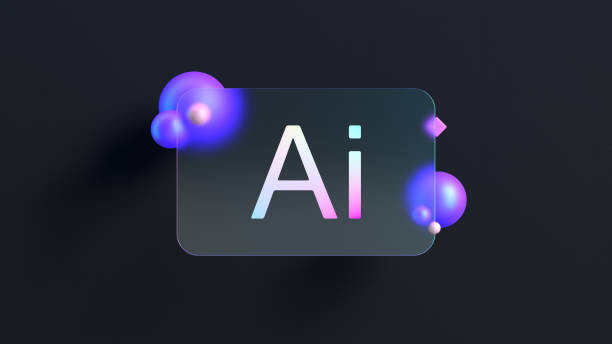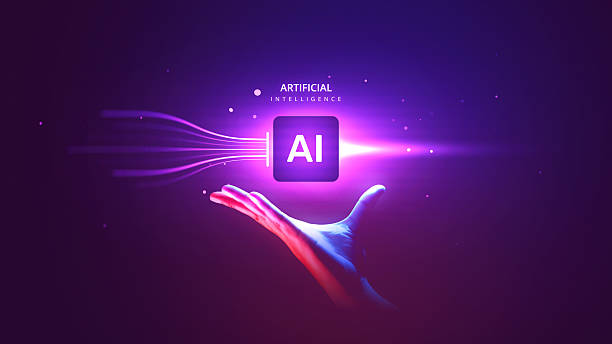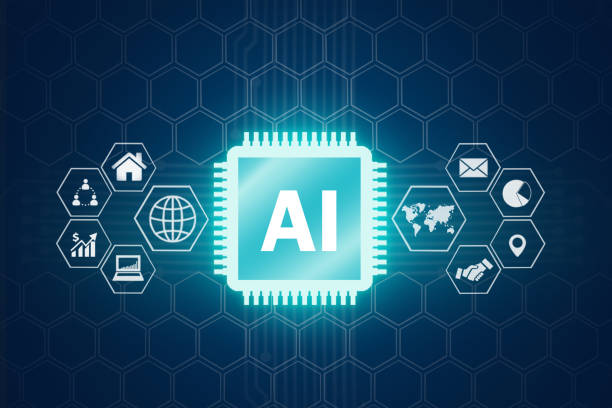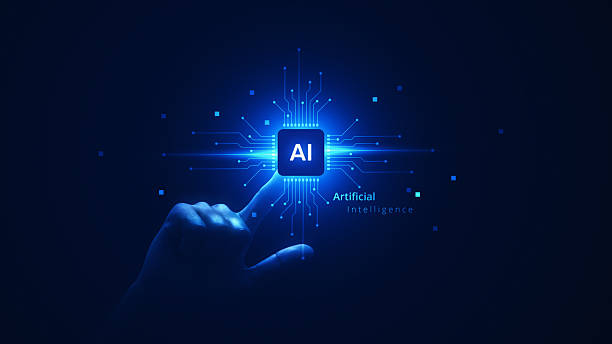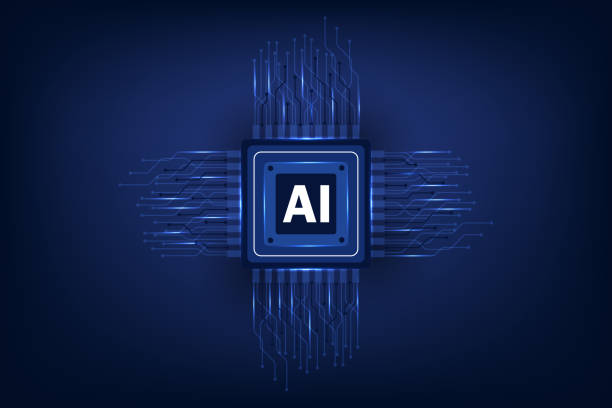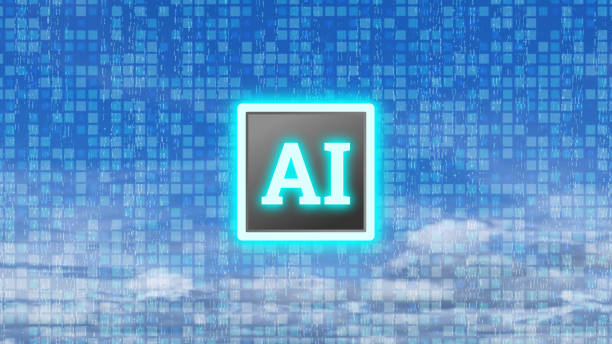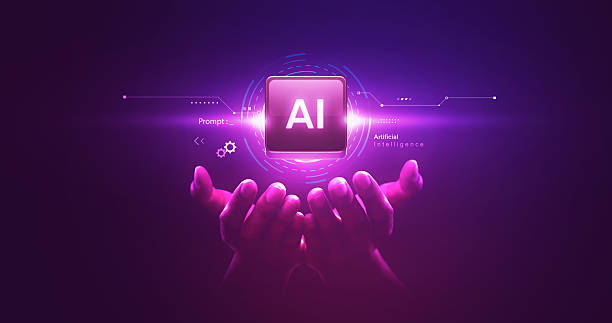Introduction to the World of Mobile AI Applications
What is a Mobile AI Application and What are its Uses?
In today’s world, Artificial Intelligence (AI) is rapidly advancing, and mobile AI applications have become one of its most attractive and widely used areas.
Mobile AI applications are software programs that run on smartphones and tablets and use artificial intelligence algorithms to perform various tasks.
These tasks can include voice recognition, facial recognition, language translation, answering questions, providing personalized recommendations, and many other things.
To better understand, artificial intelligence allows machines to perform tasks that typically require human intelligence.
Artificial Intelligence in mobile AI applications works by analyzing input data and using machine learning models to identify patterns and relationships, and make decisions based on them.
For example, a mobile AI application can analyze your purchase history and suggest products that you are likely to be interested in.
The variety of uses for mobile AI applications is vast.
In the field of healthcare, mobile AI applications can help diagnose diseases, provide medical advice, and manage medications.
In the field of education, they can provide personalized learning experiences.
In the field of business, they can help improve marketing, sales, and customer service processes.
And in daily life, they can help simplify tasks, increase productivity, and provide entertainment.
Therefore, getting acquainted with mobile AI applications and understanding their uses can help us make the best possible use of this powerful technology.
Tired of your online store not generating the revenue it should? Rasaweb, a specialist in designing professional online stores, solves this problem for good!
✅ Increased sales rate and revenue
✅ High loading speed and excellent user experience
⚡ Get free consultation on online store design
Types of Mobile AI Applications
Click here to preview your posts with PRO themes ››
Categorizing Mobile AI Applications Based on Use
Mobile AI applications can be divided into different categories based on their uses.
One of the most common classifications is based on the type of task the application performs.
For example, voice recognition applications that allow users to execute commands or type text using their voice.
Speech recognition is increasingly popular among mobile phone users.
Facial recognition applications that can identify people’s faces and take various actions based on that, such as unlocking the phone or identifying people in images.
Language translation applications that can translate texts or conversations into other languages in real-time.
These applications are very useful for traveling, learning languages, and communicating with foreigners.
Recommendation applications that suggest products, movies, music, and other content based on the user’s interests and tastes.
These applications can help users find their favorite content faster and easier.
Personal assistant applications that can help users with everyday tasks, such as planning, reminders, sending messages, and answering questions.
AI-based personal assistant applications can gradually offer more accurate suggestions by learning the user’s behavioral patterns, making life easier for the user.
In addition to this classification, mobile AI applications can also be classified based on the type of AI algorithm used.
Some applications use deep learning algorithms, which are suitable for processing complex data and providing more accurate results.
Others use more traditional machine learning algorithms, which are sufficient for simpler tasks.
The choice of mobile AI application depends on the user’s needs and expectations.
If you are looking for an application to perform simple tasks, an application with more traditional machine learning algorithms may be sufficient.
But if you are looking for an application to process complex data and provide more accurate results, an application with deep learning algorithms is more appropriate.
Click here to preview your posts with PRO themes ››
Introducing the Most Popular Mobile AI Applications
Reviewing and Comparing Popular AI Applications
In the world of mobile AI applications, a number of applications have gained high popularity due to their unique features and uses.
One of these applications is Google Assistant, which acts as an intelligent personal assistant and allows users to execute commands, ask questions, and manage their daily tasks using voice.
Google Assistant is constantly learning and improving and can gradually become an intelligent companion for users.
Another application that is very popular is Microsoft Translator, which allows users to translate texts and conversations into different languages in real-time.
This application uses advanced artificial intelligence algorithms to provide accurate and fluent translations and can help users communicate with foreigners and understand foreign texts.
SwiftKey is also another popular mobile AI application that allows users to type faster and more accurately.
By learning the user’s typing patterns, this application predicts the next words and phrases, thereby increasing typing speed.
In addition to these applications, other applications such as FaceApp, Prisma, and Replika have also gained popularity due to their fun and innovative features.
FaceApp allows users to make interesting changes to their facial images, such as changing age, gender, or adding a smile.
Prisma allows users to transform their images into the painting style of famous artists.
And Replika allows users to chat with an intelligent chatbot and share their feelings with it.
| Application Name | Main Use | Features |
|---|---|---|
| Google Assistant | Personal Assistant | Executing voice commands, answering questions, managing tasks |
| Microsoft Translator | Language Translation | Real-time translation of texts and conversations |
| SwiftKey | Intelligent Keyboard | Predicting words, increasing typing speed |
How to Choose the Right Mobile AI Application
Important Criteria for Choosing a Mobile AI Application
Choosing the right mobile AI application can be a challenging process, especially given the high variety of applications available on the market.
To choose a mobile AI application that best meets your needs, you should pay attention to a few important criteria.
The first criterion is the application’s use.
Before anything else, you need to specify what you expect from the application and what purpose you want to use it for.
Are you looking for an application for language translation? Or an application for facial recognition? Or an intelligent personal assistant? By specifying the desired use, you can narrow down your choice.
The second criterion is the quality and accuracy of the application.
A good mobile AI application should provide accurate and reliable results.
To assess the quality of the application, you can read reviews and ratings from other users or use trial versions of the application.
The third criterion is the ease of use of the application.
A good mobile AI application should have a simple and user-friendly interface and be easy for everyone to use.
The fourth criterion is the security and privacy of the application.
A good mobile AI application should protect your personal information and respect your privacy.
Before installing a mobile AI application, be sure to read its privacy policy and make sure that your information is properly protected.
The fifth criterion is the price of the application.
Many mobile AI applications are available for free, but some of them require payment to use more advanced features.
Before buying a mobile AI application, compare its price with other similar applications and make sure it is worth the purchase.
Considering these criteria, you can choose the right mobile AI application for yourself and enjoy its benefits.
Mobile AI applications can make your life simpler, more efficient, and more enjoyable.
Does your current website create the trust that potential customers should have in your business? If the answer is no, it’s time to have a professional and impactful corporate website with Rasaweb.
✅ Completely custom design tailored to your brand identity
✅ Increased lead generation and business credibility in the eyes of customers⚡ Contact us for a free consultation!
Important Tips for Optimal Use of Mobile AI Applications
Strategies for Improving the Performance and Efficiency of AI Applications
After choosing a suitable mobile AI application, using it optimally can greatly improve its performance and efficiency.
One of the most important tips is to provide accurate and complete data to the application.
AI applications learn and identify patterns based on the data you provide to them.
The more accurate and complete the input data, the more accurate and reliable the output results will be.
For example, if you are using a facial recognition application, make sure the facial images are clear and high quality.
If you are using a language translation application, make sure the input texts are free of spelling and grammatical errors.
Another point is to regularly update the application.
Mobile AI application developers are constantly improving algorithms, fixing bugs, and adding new features.
By regularly updating the application, you can take advantage of the latest improvements and features and optimize the application’s performance.
Also, paying attention to the application’s privacy settings is very important.
Many mobile AI applications need access to your personal information to provide better services.
By carefully reviewing the application’s privacy settings, you can determine what information is shared with the application and protect your privacy.
In addition, using the application’s training and personalization capabilities can also help improve its performance.
Many mobile AI applications have training features that allow users to learn how to use the application and customize it to their needs.
By using these features, you can optimize the application in the best possible way for yourself.
Finally, remember that a mobile AI application is a tool and, like any other tool, requires practice and experience.
By using the application continuously and experimenting with its different features, you can gradually increase your skills in using it and fully benefit from its advantages.
Mobile AI applications can make your life easier, more efficient, and more enjoyable, but to achieve this goal, you need to invest time and effort.
Challenges and Limitations of Mobile AI Applications
Examining Security, Privacy, and Ethical Issues in the Use of AI Applications
Mobile AI applications, despite their many advantages, also have their own challenges and limitations.
One of the most important challenges is security and privacy issues.
Mobile AI applications need access to users’ personal information to provide services, including location information, contact information, images, videos, and other data.
This information can be misused and harm users’ privacy.
For example, users’ location information can be used to track them and collect information about their habits and behaviors.
Images and videos can be used to identify people’s faces and collect information about their identity.
To address these challenges, users should carefully read the privacy policy of a mobile AI application before installing it and make sure that their information is properly protected.
They should also pay attention to the application’s privacy settings and determine what information is shared with the application.
Another challenge is ethical issues.
Mobile AI applications can make decisions that affect people’s lives.
For example, recommendation applications can influence people’s choices about products, movies, music, and other content.
Facial recognition applications can be used to identify people and recognize their identity.
These decisions can have ethical implications and harm justice and equality.
To address these challenges, mobile AI application developers must pay attention to ethical issues and ensure that their algorithms are impartial and fair.
They should also inform users how their applications make decisions and allow them to participate in these decisions.
In addition to these challenges, mobile AI applications also have technical limitations.
AI algorithms are still under development and may make mistakes in some cases.
For example, voice recognition applications may have difficulty recognizing words and phrases.
Language translation applications may make mistakes in translating texts and conversations.
To overcome these limitations, mobile AI application developers must continuously improve their algorithms and use more data to train them.
Mobile AI applications are a powerful technology that can improve our lives, but to use them responsibly, we must also pay attention to their challenges and limitations.
The Future of Mobile AI Applications
Predicting Developments and Innovations in the Field of Mobile AI Applications
The future of mobile AI applications is very bright and full of potential.
With the increasing advancement of artificial intelligence technology, it can be expected that mobile AI applications will become more powerful, smarter, and more practical.
One of the important developments that can be witnessed in the future is the increase in machine learning capabilities in mobile AI applications.
Using advanced machine learning algorithms, mobile AI applications can continuously learn from input data and improve their performance.
For example, a language translation application can increase the accuracy of its translations by learning from the translations done by users.
A facial recognition application can increase the accuracy of its facial recognition by learning from new facial images.
Another development is the increase in natural language processing capabilities in mobile AI applications.
Using advanced natural language processing algorithms, mobile AI applications can better understand human language and provide more accurate responses.
For example, a personal assistant application can better understand users’ questions and provide more relevant answers.
A chatbot application can have more natural conversations with users.
In addition, it can be expected that mobile AI applications will integrate with other technologies, such as augmented reality (AR) and virtual reality (VR), and provide new user experiences.
For example, an online shopping application can use augmented reality to allow users to try products in their real environment before buying them.
A tourism application can use virtual reality to allow users to visit tourist attractions before traveling.
It can also be expected that mobile AI applications will find applications in new areas such as health, education, transportation, and energy.
In the field of health, mobile AI applications can help diagnose diseases, provide medical advice, and manage medications.
In the field of education, they can provide personalized learning experiences.
In the field of transportation, they can help improve traffic, reduce accidents, and provide intelligent transportation services.
And in the field of energy, they can help optimize energy consumption, manage power grids, and provide intelligent energy services.
With their vast potential, mobile AI applications can play an important role in the future and improve our lives.
Mobile AI Applications
The Impact of Mobile AI Applications on Daily Life
Examining the Positive and Negative Impacts of AI Applications on Lifestyle and Social Interactions
Mobile AI applications have increasingly penetrated our daily lives and have had significant impacts on our lifestyle and social interactions.
On the one hand, mobile AI applications can make our lives easier, more efficient, and more enjoyable.
They can help us with everyday tasks, such as planning, reminders, sending messages, and answering questions.
They can help us learn new skills, such as foreign languages, music, and art.
They can help us with entertainment and recreation, such as watching movies, listening to music, and playing games.
Mobile AI applications can help us connect with friends and family, such as sending messages, making calls, and sharing photos and videos.
On the other hand, mobile AI applications can also have negative impacts on our lives.
They can reduce our face-to-face social interactions.
Instead of meeting our friends and family in person, we may prefer to communicate with them through mobile AI applications.
They can increase our dependence on technology.
We may become dependent on mobile AI applications and not be able to live without them.
They can reduce our privacy.
Mobile AI applications can collect our personal information and use it for advertising or other purposes.
They can increase our stress and anxiety.
We may worry that mobile AI applications will endanger our personal information or that they will replace our jobs.
To use mobile AI applications responsibly and reduce their negative impacts, we need to pay attention to a few points.
First, we need to maintain balance in the use of mobile AI applications.
We should not become dependent on mobile AI applications and should maintain our face-to-face social interactions.
Second, we need to be careful about our privacy.
We should carefully read the privacy policy of a mobile AI application before installing it and make sure that our information is properly protected.
Third, we should use mobile AI applications for positive purposes.
We can use mobile AI applications to learn new skills, connect with friends and family, and enjoy entertainment and recreation.
By using mobile AI applications responsibly, we can benefit from their advantages and reduce their negative impacts.
| Positive Impacts | Negative Impacts |
|---|---|
| Increased Efficiency and Productivity | Reduced Face-to-Face Social Interactions |
| Easy Access to Information and Services | Increased Dependence on Technology |
| Entertainment and Recreation | Reduced Privacy |
| Improved Communications | Increased Stress and Anxiety |
Did you know that 85% of customers check your company’s website before any interaction?
With Rasaweb, build a corporate website that deserves your credibility.
✅ Increased customer credibility and trust
✅ Attracting high-quality leads
⚡ Get a free website design consultation
How to Build a Mobile AI Application?
Steps and Tools Needed to Develop an AI Application
Developing a mobile AI application is a complex and multi-step process that requires various knowledge and skills.
The first step is to determine the goal and application of the app.
Before you start developing the application, you must specify what your goal is and what you want your application to do.
Do you want to build a language translation application? Or a facial recognition application? Or an intelligent personal assistant? By specifying the purpose of the application, you can narrow down the scope of your work and focus on the essential features.
The second step is data collection.
Mobile AI applications need a lot of data for training and learning.
You must collect the data needed for your application.
This data can include images, videos, texts, sounds, and other information.
The more data you have and the more diverse it is, the better your application will be trained and the better it will perform.
The third step is to choose the AI algorithm.
There are various AI algorithms that you can use to develop your application.
Choosing the right algorithm depends on the goal and application of your application.
Some algorithms are suitable for image recognition, others for natural language processing, and others for machine learning.
The fourth step is to develop and train the AI model.
After choosing the algorithm, you must develop your AI model and train it using the data you have collected.
This process may be time-consuming and complex and requires specialized knowledge and skills in the field of artificial intelligence.
The fifth step is to develop the application user interface.
After developing and training the AI model, you must develop the user interface of your application.
The user interface should be simple, user-friendly, and attractive.
Users should be able to easily use your application and interact with it.
The sixth step is testing and evaluating the application.
After developing the user interface, you must test and evaluate your application.
You must make sure that your application works properly and provides the desired performance.
If there are any problems, you must fix them.
The seventh step is to publish the application.
After testing and evaluating the application, you can publish it in application stores, such as Google Play and the App Store.
To develop a mobile AI application, you need various tools.
These tools can include programming languages, artificial intelligence libraries, application development platforms, and other tools.
Some common programming languages for developing mobile AI applications include Python, Java, and C ++.
Some common artificial intelligence libraries include TensorFlow, PyTorch, and Scikit-learn.
Some common application development platforms include Android Studio and Xcode.
Mobile AI Applications
Conclusion and Final Points
Summary of the Most Important Points and Recommendations Regarding Mobile AI Applications
In this article, we comprehensively examined mobile AI applications and reviewed various aspects of it.
From the definition and use of mobile AI applications to types, the most popular applications, how to choose, tips for optimal use, challenges and limitations, the future and its effects on daily life.
We also mentioned the steps and tools needed to develop a mobile AI application.
In the end, we will provide a summary of the most important points and recommendations.
Mobile AI applications are a powerful technology that can improve our lives.
By using mobile AI applications responsibly, we can benefit from their advantages and reduce their negative impacts.
When choosing a mobile AI application, pay attention to the purpose and use of the application, quality and accuracy, ease of use, security and privacy, and its price.
To optimally use mobile AI applications, provide accurate and complete data, update the application, pay attention to privacy settings, and use training and personalization capabilities.
Pay attention to the challenges and limitations of mobile AI applications and be aware of them.
AI algorithms may make mistakes and your personal information may be misused.
Mobile AI applications are constantly evolving and developing.
In the future, it can be expected that mobile AI applications will become more powerful, smarter, and more practical.
Mobile AI applications can have positive and negative impacts on our lives.
By using mobile AI applications responsibly, we can benefit from their advantages and reduce their negative impacts.
We hope this article has provided you with useful information about mobile AI applications.
Frequently Asked Questions
| Number | Question | Answer |
|---|---|---|
| 1 | What is a mobile AI application? | It is an application that implements artificial intelligence capabilities such as machine learning, natural language processing, or computer vision to perform intelligent tasks on mobile devices. |
| 2 | Name a few examples of mobile AI applications. | Voice assistants (such as Siri, Google Assistant), augmented reality filters in cameras (such as Snapchat, Instagram), facial recognition systems, and language translation applications. |
| 3 | How do mobile AI applications work? | Some run AI models directly on the device (on-device) and others use cloud-based processing to perform heavier calculations. |
| 4 | What are the benefits of using artificial intelligence in mobile applications? | Improving user experience through personalization, automating tasks, increasing efficiency, and providing innovative and intelligent capabilities. |
| 5 | What are the challenges of developing mobile AI applications? | Hardware limitations (RAM, processor), battery consumption, the need for optimized models, and issues related to data privacy. |
| 6 | What technologies are used to build mobile AI applications? | Frameworks such as TensorFlow Lite for Android and iOS, Core ML for iOS and ML Kit from Google. |
| 7 | How do mobile AI applications ensure user privacy? | By processing data locally on the device, reducing data sending to servers, and using encryption and privacy-preserving techniques. |
| 8 | What will the future of mobile AI applications be like? | It is expected that with the advancement of mobile hardware and AI algorithms, these applications will become smarter, more efficient, and more integrated with daily life. |
| 9 | Can mobile AI applications work offline? | Yes, many of them can. AI models can be stored on the device and perform processing without the need for an internet connection, such as facial recognition or offline translation. |
| 10 | What are the key features of a good mobile AI application? | High accuracy, proper processing speed, optimal battery consumption, user-friendly interface, ability to learn and adapt, and protect user privacy. |
And other services of Rasa Web advertising agency in the field of advertising
Intelligent Website Development: Transform sales growth with user experience personalization.
Intelligent Direct Marketing: Designed for businesses seeking customer behavior analysis through an SEO-driven content strategy.
Intelligent Digital Advertising: Professional optimization for campaign management using custom programming.
Intelligent Marketplace: An effective tool to improve SEO ranking with Google Ads management.
Intelligent UI/UX: A fast and efficient solution for user interaction with a focus on attractive user interface design.
And more than hundreds of other services in the field of internet advertising, advertising consulting and organizational solutions
Internet Advertising | Advertising Strategy | Report Advertising
Resources
Best AI Applications for Android and iOS
,What is AI Application? What are its uses?
,What is Artificial Intelligence? — In simple language (+ uses, advantages and disadvantages)
,



